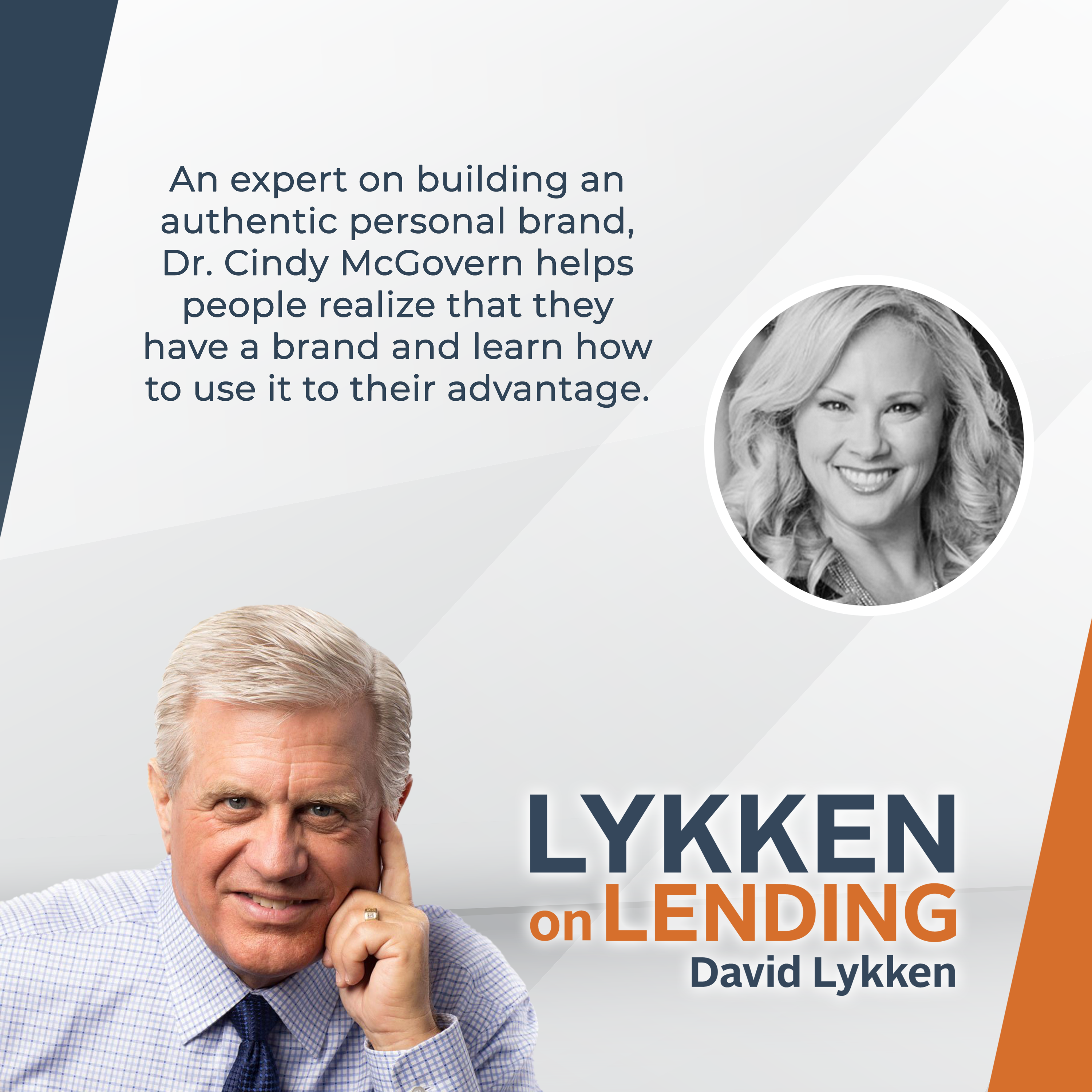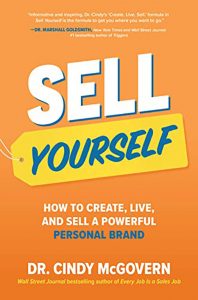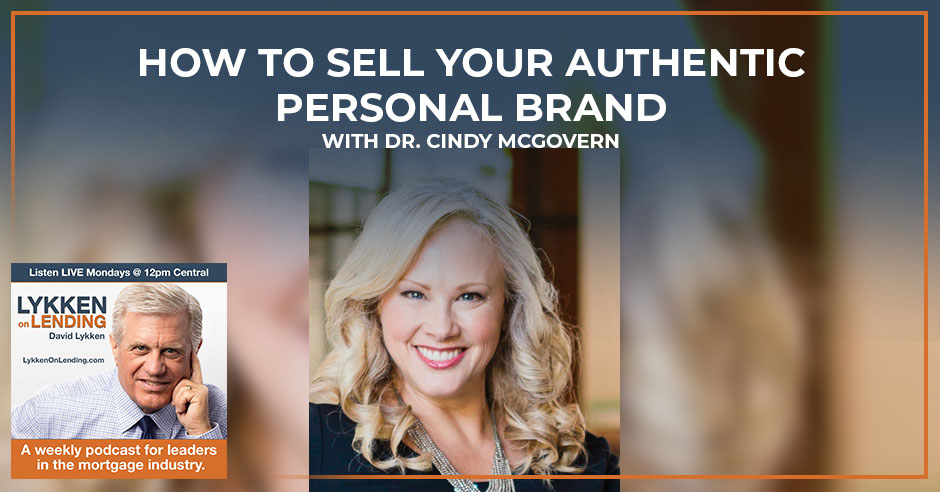Everybody has a personal brand whether they know it or not. So in order to sell your brand, you have to first live it. No one likes a person who is faking their brand. Trust is the most important thing when it comes to buying and selling. Be authentic so that you can truly sell your brand. Join David Lykken as he talks to the founder of Orange Leaf Consulting and Orange Leaf Academy, Dr. Cindy McGovern about her newest book, Sell Yourself. Learn how to craft, live, and sell your personal brand. Start recognizing your message today!
—
How To Sell Your Authentic Personal Brand With Dr. Cindy McGovern
I’m excited to have to join me back on the show, Dr. Cindy McGovern. She’s a Wall Street Journal Bestselling Author. Every job is a sales job. We talked about that in the past. Let’s get going with this interview because she has a new book coming out. We’re going to hear about it, but we’re also going to get something on a topic that is important for all of you. It’s great to have you here, readers. Dr. Cindy McGovern, it’s so good to have you here. I appreciate you and your heart to help and work with people. You’re awesome.
You are so kind. It’s so great to be back here. Thank you so much for letting me get on here, give this message to folks, and try to help even more people.
It’s good to have you back, and it’s so exciting. We’re talking about personal brands, which is what your book is about. We’re going to talk more about your book at the end, but I want to get into the topic of personal brands. Everyone thinks that a company has a brand. Some departments have brands. That’s not as common, but brands certainly are associated with larger corporations or all companies on all sides. People need to be aware of a personal brand. That’s what we’re going to be talking about here. What is a personal brand, Dr. Cindy? Why is it an important one, especially the one that someone is to be aware of that they need to create for themselves?
The first thing is that a personal brand is how people think about you. It’s often confused with your reputation, but it’s not. Your reputation is a facet of your brand. Your brand is what people say about you when you’re not in the room, how they’re going to tell a story about you, and it’s who you want to be known as. If you even think about a product brand, you can think of the packaging, what it is, and what it does for you. It’s the same thing with a person.
What I would encourage folks to recognize is that they have a brand, whether they realize it or not. Part of messaging is helping them to know that you have this brand. Is it on purpose? Is it giving the message that you want others to take away? I want to help people to hone that message so that they have the impact they want to in the world.
When people think of a brand, they think of a message. They think that a part of your brand is, “Do you show up to meetings on time? Do you show up prepared?” There are so many elements that go into a brand that we take for granted as part of the byproducts of who I am. That all is encompassing of the brand. Can you explain the connection between personal branding and sales? Sometimes, people mumble those two up, and there is a distinction that you can help us with.
It’s funny because the brand is what you’re selling. I would argue that that’s the most important sale you’ll never be going to make. It is how you sell yourself. There is huge confusion about that because people think, “If I show up on time, people know who I am, what I do, and what I’m bringing to the table.” That’s one facet of so many other things.

What people need to recognize is that even if you have this great brand, you’re doing all the things you’re supposed to do, and you’re checking all the boxes, are you living it? Are you selling it? Are you getting it to advocate for you? If you’re not, that brand is just there. It’s like having a thing on the shelf but never advertising it.
That’s so good. Everyone thinks of a product, but you are the product, readers. They’re buying and getting a mortgage loan through your mortgage company, but who’s the person that’s making this happen? It’s you, the person, and it is so important. You are the brand, folks. You are the one. That is such a great point. What are the three critical components of a successful personal brand? You talk about this in the book, and they’ll tease us a little bit or give us more information. They got to buy the book but tell us the three most critical components.
There’s an often skipped step, which I’ll talk about. The first thing is you have to create a brand and it’s being mindful of what that is. What is your brand, what do you want it to be, and what is your legacy? People forget that they’re already building a legacy, the one you mean to be building, especially folks that want to get into a leadership role. Your leadership legacy starts way before you ever get that on your business part.
You got to craft that brand like you craft a business plan. You’re the business of you. You’re the CEO of you. The next thing is then you start living it, and then you bring it to life. That’s where you show up on time, and make sure you respond to those emails. You’re going above and beyond. You’re making sure that customer has everything that they need.
We call it customer service, but it’s more than that. It’s about a customer experience. It’s about interacting with other human beings so that they have a positive story to tell about you when you’re not there, whether they were an actual customer of yours or not. We forget that every interaction is a transaction of some sort.
This starts getting into sales strategy, which is another thing your first book gets into. You help people with this, but you take it to another level. What are the most effective sales strategies to help people sell themselves in any situation? These are one of those markets where a lot of different situations can vary almost day-to-day based on the direction of interest rates applied at home. What are the most successful strategies that you recommend?
It’s funny because the third critical component is that you’ve got to sell that brand. Part of a successful sales strategy has a sales plan. It’s like you have a sales plan for your business. You have a target list.
As a leader, your leadership legacy starts way before you ever got that on your business. Click To TweetIt’s mostly a sales plan and sales strategy. Are those one and the same in your mind or are those a little different?
Strategy is where you want to go and what that bigger picture is. The plan is the action items to get the actionable steps. People don’t take enough time in their personal brand to think of what that is because you can go off-brand in a second, and it affects everything else. One misstep can affect all the things that you’ve done. When that step-in moment comes in, recognize that every interaction is a transaction, and you’re selling 24/7, especially when you’re the brand.
For a mortgage loan officer, we know this. You’re selling everywhere you go. You’re selling in the supermarket. Everyone you come in contact with is a potential referral source, at least, if not a potential customer. What is your strategy in terms of getting the message out about who you want to be known as because it’s hard to differentiate?
There’s the brand of the company, but it’s the brand of you. What are you doing to make people trust you faster so that they want to use you or refer you when they have that opportunity? That sales plan is how you build that network. That’s how you start getting in front of the right people so that they can tell the story about who you are so that you build those minions. Your network should be working for you.
What you’re talking about is a sales reputation or a sales legacy. When someone talks about David Lincoln or Dr. Cindy, they go, “I love talking to Dr. Cindy because,” and they state your legacy. Talk a little bit about how does your personal brand shape your legacy? What’s the relationship there?
It is your legacy. At the end of the day, it is truly the steps and the footprints you’re leaving behind with people.
When you say footstep, it’s an experience they have with you. That is what you’re talking about there.

Personal Brand: A lot of people get confused with personal brand and reputation. Reputation is a facet of your brand. Your personal brand is really what people say about you when you’re not in the room.
It is. We forget that if you have a five-second interaction with somebody, you make an impression on them.
One way or another, you made an impression. How do you go in and start correcting when something doesn’t go quite as you want? The different one is we either step into ourselves or a circumstance that we didn’t anticipate caused by our company or by people that work with us, or circumstances outside of our control can make us not look like that. If they wanted someone to blame, they even wanted to point the finger. How do you work on that?
That’s the best chance for you to sell your brand because it’s the way that you react to that, and it’s how to interact with them. When there is a problem, anybody can sell something great when the market is good. We all know this. It’s when those little hiccups happen or challenges come into play. When market economies are good, and products are flying off the shelves, they’re not as worried about packaging and positioning.
We’re worried about that all the time because we’re trying to differentiate in a fairly commoditized world. Part of the challenge is when you have that moment to come through for somebody, even if the answer is no, even if you can’t fix it, but it’s the way you handle it, you leave them with that impression of who you are and how you did it. It’s the ethics, too. It’s the ethical aspect of, “This is not the right thing for you.” Maybe you walk away because it’s not the right thing.
The ability to walk away is one of the most powerful negotiating tools in the world. When you are so desperate for every transaction, and you don’t realize this may not be the best transaction for you or the relationship we have going, it may not be the best. They have that ability to walk away and bring a lot of power. Talk about someone who needs to rebrand themselves during a job change or a career change.
That is one of the things that’s happening right now in the world. We already know the Great Resignation, the Great Regret, the Great Reset, and I would argue that next is the Great Rebrand. It’s what’s happening. What I would encourage people to do is whether you’ve changed jobs or not, the world around you has changed. Customer bases changed.
Any mortgage loan officer that’s dealt with anybody in the last few years, their hair was on fire and other body parts were catching, so there were lots of things going on. As we’re rebranding, when there’s a little bit more normalcy in the market, when there’s a little bit more breathing room, it’s what you’re doing to bring that experience forward, so they have a great experience with you.
Anticipate changes. Make sure you're positioning yourself to be the go-to person when the pie gets smaller. Click To TweetThat is an important part of that thing, sadly because of the number of layoffs that are happening. There are a lot of people having to change jobs or even change careers. This is such a poignant point you bring out there. How do you know when it’s time to rebrand yourself? There are different markets and seasons in the business cycles, and for each one of those, you need to rebrand yourself. There’s a great book out. I have it right here on my shelf, Who Moved My Cheese?. Every time you talk about something having to move, there is a market shift. Is it rebranding or repositioning? Clarify that.
It’s both. The repositioning is looking at the market that you’re going after. The rebranding is selling to that market. It would be my layman’s definition of the two, but Who Moved My Cheese? is one of my favorite books because it talks about that reactionary aspect of what we do when things change around us. What I would encourage your readers to think about is how they’re anticipating those needs to change. At the end of the day, we’re a cyclical business. We know this. How are you anticipating those changes? How are you making sure you’re positioning yourself to be the go-to person when the pie gets smaller, the home price has changed, or the inventory has changed?
That’s repositioning yourself for when the market does shift and that’s then there. That’s a part of the rebranding from, “I’m thinking more futuristic and I’m a person that you want to be in a relationship with long-term.” Is that what you’re getting to?
It’s a referral business. At the end of the day, you are truly selling yourself. It does have to do with what products you can sell based on where you work and that thing. We all know this, especially mortgage loan officers. Your clients follow you. They want you and trust you. That’s what you’ve sold them. You’ve sold them that you’re going to give them the best possible experience, tools, resources, and products, but they bought your trust, and you bought their trust.
Trust is the currency on which all sales should be built, and the foundation upon which it all happens. What are some of the potential problems of selling against an old brand? Let’s say you are good at a particular aspect of the business, whether it has been refinances. Now, we’re in a purchase business. It’s one of the most obvious that we’re saying. How would you address these problems in advising someone?
That’s one of my favorite questions because that’s what everybody has to deal with right now. It’s refi now purchase. If you became known as the refi gal or guy, that’s part of the challenge. They don’t know you have a multifaceted brand and that skillset. Part of what you have to sell at this moment is that transferable skillset. You can do it. You’ve been doing purchase loans before the refi was booming anyways, but they don’t know you as that.
That’s where the proactive versus reactive part comes in because when there was the whole refinance, they were coming to you. You were the flower, not the bee. Now, you’re having to go “bee” that person. You have to get that message out there. I would encourage folks that are reading and thinking about that brand. If you are known as that, you’ve got to control and change that narrative out in the market. If they say she or he was great with refi, “That’s only one thing I do. Do you know that we do this and this, and all these other pieces?” Make sure you’re being proactive about the story people are telling about you.

Personal Brand: You have to craft your brand first. Then you have to start living it. You bring that brand to life. And lastly, you got to sell your brand which is why you need a sales plan.
That’s so important, but there are times when a brand that you thought was going to work isn’t working for you. That can present a little bit of a crisis. How long do you work with a brand approach to branding yourself? When you say it’s time to make a change, any advices that vary from the situation, and if someone’s market-driven, how quickly do you change brands?
You can’t change on a dime because that in and of itself will fly in the face of your brand. If you’re, “I’m this,” but, “Tomorrow I’m this,” we all have that friend that changes careers every five seconds. It seems like, “I want to be this or that.” You want to be careful about that. When it comes time to rebrand in that role, what you look at is, is it still serving you? You know how to reach your goals.
Are you still impacting the same amount of lives? If you’re not, then you seek some feedback for hearing and look for those blind spots for yourself in terms of, “Why isn’t this brand working? Is it me that changed, or is it the world that changed around me?” Part of why I wrote this book and want to help people with this is that the world has changed. You got to sell differently to them now. The expectations of the world have changed. Look for that feedback. If you’re not getting what you want out of life, job, and work, there’s probably a little rebranding that needs to happen.
I’m thinking of as more and more Millennials come into the industry, how they want to interact is going to be quite different from some people that have the old brand, “I’ll come and meet you.” They go, “I don’t want to meet you. I don’t meet people. Can we do it online? Can you text me this?” If you don’t have those rebranded yourself and the communication styles of the real, the new customer that’s coming to you, that’s important. In your book, you talk about going off-brand. Explain that.
Going off-brand is basically going against what people’s notion of you is. There are times when you’re rebranding, the reaction can be like, “That’s not her. That’s not him. He’s this guy. He’s that guy. She’s this girl. She’s that girl.” Part of it is that it could be happening during the transition, but usually when you go off-brand, it’s something that’s very out of character for you. It’s not how people know you. By the way, this can happen to anybody. We can all have a bad day. We can all snap at somebody or we can all fire that email before we take a second to breathe.
Part of the challenge is making sure we take a breath. If you’ve gone off-brand, you’ve gone against that character, own it. The first thing to do to fix it is own that it happened because the more you explain it away, it creates distrust with your community and the people around you. You said it a second ago. No sale happens without trust.
If you’re trying to sell yourself and then sell loans or whatever it is that you’re selling, part of the challenge is you’ve got to build back the trust, and you broke the trust by going off-brand. It’s recognizing that and saying, “I had a bad day. I’m human, too. That’s not what I meant. Let me fix it.” You then have to build that trust back up. You have to work a little harder to get that back. We’ve probably all got that.
You can't change your brand on a dime because that in and of itself will fly in the face of your brand. Click To TweetWe’ve got somebody in our lives where we reacted too quickly. You saw how that created a little chain reaction in them. We need to fix that because what ends up happening is you change the narrative that they say about you. You don’t want that narrative getting out. The sooner you can fix the off-brand piece, the better. It’s like celebrities. When celebrities do something, they have publicists that go out there and fix things.
If you slap someone on the stage, it is the most celebrated big one out there. How do you quickly recover from that? How were you when you were out of off-brand? That’s the thing you’re talking about. Own it, number one. We did not see that happen in that particular case. There’s a whole science and a whole industry that is around when people go off-brand.
On a personal basis, your book is a great resource for that. Let’s get to your book. In your book, you talk about someone’s personal life, or you might say their side interest, hustle, or ambitions that could be selling tickets to the latest raffle for your kid’s high school. It could be some strong religious convictions that you have.
You’re wanting to get more people to go to your church or something like that. All that can affect your personal brand. I’m wanting to get some suggestions. You have some boundaries that people consider when they have these. We’re not all business. We are people. It’s important for authenticity where you share your life, but where does that go awry, confuse your brand, and how can it complement?
It’s a great question and a complex one. Let me deconstruct a little because the biggest piece of that is recognizing what your brand is known as, to begin with. Get a little inventory of how people think you are and who they think you are. Is it in line with who you want to be known as? I completely agree with you. We have to be authentic. If you’re not authentic in your brand, you’re not going to be able to sustain it. It’s going to be exhausting if you’re faking it.
We are human. I call it multifaceted. It’s like a diamond. We’re multifaceted human beings. You’re a parent, sibling, and friend. You’re doing the raffle and on this charity. When it, again, flies in the face of the brand as people know it, or it detracts from the brand you’re trying to sell them. If there are complete brands, you can be a parent selling the raffle ticket and be an amazing mortgage loan officer. They can marry together, but it’s when they don’t fit. That’s where the private life or the side hustle can damage your brand. If it’s so far away from the core of who people are and how hard you’ve worked to sell that brand.
It’s not that you’re saying you don’t have those side hustles, interests, or ambitions, but it’s using wisdom to what degree and how far that might be off from how people know you. Is that what you’re saying here?

Personal Brand: Going off brand is to go against what people’s notion of you is. So to fix that, you have to own it. Because the more you explain it away, it creates distrust with your community.
That’s exactly it. I would even take it one more step, David, and say, “Keep your private life private sometimes.” It’s a peer review society. If somebody sees that you posted something on your highlight reel, which let’s be honest, everybody’s social media is their highlight reel, it doesn’t seem to fit. That also is part of the message. That’s the thing I want people to recognize. You’re selling 24/7, whether you realize it or not, because you’re either online, so your online presence. It’s people who are talking about you. You’ve got to make sure that story is the same across the board.
That’s bringing up so much because we’re talking about authenticity and being yourself. I’m thinking of one particular bank president. He had us come in and work with him at one particular time. We looked at their brand. I said, “Are you aware and have you taken a look at some of your employees that are out there and how you have a particular value system and this particular bank that had a real strong conservative value system?”
Yet the employees who state they work for this bank and show up in connection with the bank are out doing keggers and various inappropriate things out there, and it’s posted all over social media. That’s an example of that. We’re not telling you not to go out and do that, but use some wisdom and how you’re posting it. That’s a challenge, especially for the younger ones that are going, “I’m going to live my life. I don’t want to have to be that.”
That is one to navigate with some advice from you and, quite frankly, from your book. Your book is excellent. I have one more question then I want to get into talking about your book. What are the benefits of aligning your brand with the employees? We’re talking about the bank. If they’re so far apart or you love to party and post pictures about partying, maybe you shouldn’t work for a conservative bank that has different stated values. Is that what is important?
That’s important. Many companies are now looking at hiring based on values. This started many years ago with Ben & Jerry’s. It was one of the first values that they were public about. That’s something that companies are doing. They’re looking for people that align with those values. It also makes it easier for everybody. If your values do align because it’s easier to be authentic, you’re being yourself.
Quite frankly, every single person in that organization is an ambassador, whether they’re a salesperson or not or a mortgage loan officer. If they’re living those values, it does nothing but reinforces the brand. Employers know that, so they want people that can be authentically themselves. Going back to your comment about somebody that’s going to the kegger or whatever, it doesn’t mean you can’t do that but there’s a filter you can put on, privacy.
It’s not that you can’t post it. You can still post it without the property, so your friends see it, not put it out for the whole bank to see it.
If you're not authentic in your brand, you're not going to be able to sustain it. Click To TweetTo the point of companies hiring people that have those same values, it’s also recognizing it’s a culture that you’re building, and it’s happier employees. It’s better culture. I truly believe in employees first because if your employees are happy, they’re going to take care of your customer. Companies recognize that as well. It’s super important to recognize that this is a trend that started many years ago and is becoming more important than ever, especially in more of a remote or hybrid work environment maintaining that company culture. Looking at aligning those values is even more crucial now than it ever was maybe a few years ago.
You’ve raised this whole topic of a brand, your personal brand, the corporate brand, any dissonance, or too far separation. Everyone thinks that this is only applicable to the younger generation coming in because they’re coming out of college, and they were used to posting all the party pictures in a dress that may not be appropriate. I want to talk about the tie or what they’re wearing and how little or much they’re wearing might seem like, “I just did it. I’m being what I am.” You grow into the business world, but you’d think it’s that group.
We had an individual recently who posted something, and he’s well up there in the years and had too much alcohol. Unfortunately, pictures were taken and got posted that assassinated his brand. Cindy, it is so important that people be aware of this. Every moment, if a picture was taken of you doing this right now and it got posted, how does this fit? Is it congruent with your brand or is it a complete what-on-Earth type of thing?
It’s important, which is a good reason why people should read your book. There are a lot of obvious great tests. Some of the obvious ones are going to be talking about some oh-my-gosh type of moments. It’s so important that people be aware or cognizant of it. Let’s talk about your book. When is it going to be published?
It’s going to be out on September 27th, 2022.
It’s right around the corner. How perfect timing with our releasing of this interview of you. Where can they buy it? What means by which they can read it or listen to it? I love the part that you do in Audible. That’s a hit.
It is available at your local bookseller online at Amazon, Barnes & Noble, Books-A-Million, Indie Booksellers, and our website as well. The biggest thing is that I am recording the Audiobooks, so I will be in the studio. It’s me reading it, which is fun. It’s also going to be available in electronic format.

Sell Yourself: How to Create, Live, and Sell a Powerful Personal Brand
There is one reason I love authors reading their own material. It’s because you get an insight into whether there’s something that gets transferred when you hear the tenor of someone’s voice. The way they communicate comes through how their voice sounds. I’m excited that you’re reading it and not letting some professional reader do it, so way to go. I’ll be reading it and listening to it. I may start listening to it because I’m an Audible guy. I could consume a lot more and then I go back and read it, which I did with your first book. You’re amazing, Dr. Cindy. If people want you to come to speak or they want to get to know you and retain you, what are some other ways that they can reach you?
You can reach me at DrCindy.com. My email is easy. It’s [email protected]. I answer my own emails. I’d be happy to talk with folks because it’s so important through this great rebranding that we’re going through. My goal is to help people to be able to reach their personal and professional goals by recognizing how powerful your personal brand is in doing that.
It’s so exciting to get to spend another time with you. I hope this blesses our readers as much as I know you have helped so many people. Thank you so much for taking time out of your busy day to be here with us, Dr. Cindy.
It is a pleasure. I always enjoy talking with you. Thank you for having me.
You bet. Folks, get both her books, and you will not be disappointed. Share amongst your staff. This is something that people need to be aware of, especially when you’re getting concerned about some people on their brand being a little not representative of your brand as a company leader and as a company. This would be a great book to hand out.
It should be in the book in the library and handed out to everyone as they start their new job with your company. It should be like, “Here’s a welcome packet. In this book is your personal brand. It is a great book.” I encourage you to get it. Thank you again, Dr. Cindy, for being here. I appreciate your friendship and the relationship. You’re outstanding. I love what your message is and what your mission is. Thank you.
Thank you so much. That means a lot.
Important Links
- Dr. Cindy McGovern
- Who Moved My Cheese?
- Amazon – Sell Yourself: How to Create, Live, and Sell a Powerful Personal Brand
- Barnes & Noble – Sell Yourself: How to Create, Live, and Sell a Powerful Personal Brand
- Books-A-Million – Sell Yourself: How to Create, Live, and Sell a Powerful Personal Brand
- Indie Booksellers – Sell Yourself: How to Create, Live, and Sell a Powerful Personal Brand
- https://OrangeLeafConsulting.com/
- https://www.OrangeLeafAcademy.com/
About Dr. Cindy McGovern
 Dr. Cindy McGovern a Wall Street Journal Best Selling Author of “Every Job Is a Sales Job” and the upcoming book “Sell Yourself: How to Create, Live and Sell a Powerful personal brand. As the founder of Orange Leaf Consulting and Orange Leaf Academy she helps organizations, entrepreneurs, and individuals create dynamic and robust sales processes. She has worked with hundreds of organizations of all sizes and specialties across the globe and is now one of the most sought-after business and sales authorities.
Dr. Cindy McGovern a Wall Street Journal Best Selling Author of “Every Job Is a Sales Job” and the upcoming book “Sell Yourself: How to Create, Live and Sell a Powerful personal brand. As the founder of Orange Leaf Consulting and Orange Leaf Academy she helps organizations, entrepreneurs, and individuals create dynamic and robust sales processes. She has worked with hundreds of organizations of all sizes and specialties across the globe and is now one of the most sought-after business and sales authorities.


